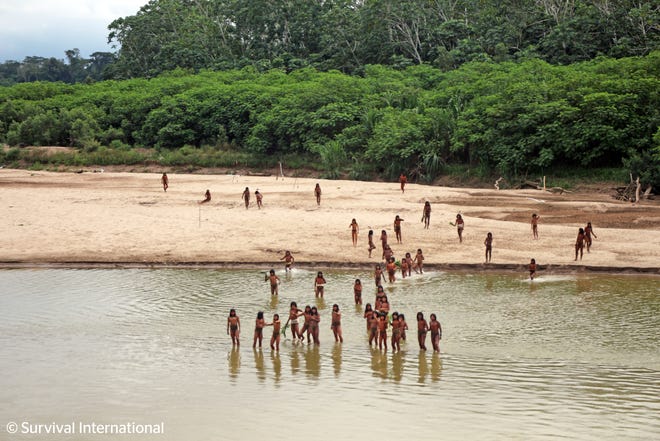New photos and rare video of an uncontacted Indigenous tribe in the Peruvian Amazon show a collection of the people emerging from a rain forest – perhaps due to encroaching logging operations.
The Mashco Piro people, which human rights group Survival International says is the largest uncontacted tribe in the world, were given a territorial reserve in 2002. But the Peruvian government also gave concessions to several logging companies within the tribe’s territory.
The nearest logging operation is just a few miles from where the Mashco Piro were filmed in southeast Peru, says Survival International, which released the photos Tuesday.
Many risks exist from loggers and the Indigenous people interacting, Alfredo Vargas Pio, president of regional Indigenous organization FENAMAD, said in a news release.
“This is irrefutable evidence that many Mashco Piro live in this area, which the government has not only failed to protect, but actually sold off to logging companies,” he said in a statement. “The logging workers could bring in new diseases which would wipe out the Mashco Piro, and there’s also a risk of violence on either side, so it’s very important that the territorial rights of the Mashco Piro are recognized and protected in law.”

Who are the Mashco Piro?
The Mashco Piro number more than 750 and live in the rain forests of southeast Peru, according to Survival International.
Several dozen of the Indigenous community appeared in late June on the banks of the Las Piedras River in Monte Salvado within the Madre de Dios province of Peru, which borders Bolivia and Brazil. Separately, another group of 17 appeared near the neighboring village of Puerto Nuevo, Survival International says.
Another tribe, The Yine, who are not isolated and speak a language related to Mashco Piro, have previously reported that the Mashco Piro “angrily denounced the presence of loggers on their land,” Survival International said.
The Mashco Piro have also been sighted across the border in Brazil, according to Rosa Padilha of the Brazilian Catholic bishops’ Indigenous Missionary Council in the Brazilian state of Acre, Reuters reported.
“They flee from loggers on the Peruvian side,” she said. “At this time of the year they appear on the beaches to take tracajá (Amazon turtle) eggs. That’s when we find their footprints on the sand. They leave behind a lot of turtle shells.”
“They are a people with no peace, restless, because they are always on the run,” Padilha said.

Peru: Indigenous people and loggers have clashed
The “incredible images,” Survival International director Caroline Pearce said, “show that very large numbers of uncontacted Mashco Piro people are living just a few miles from where loggers are poised to start operations.”
It’s not the first time that signs suggested the Mashco Piro were feeling encroached upon by logging in their territory. In two incidents – one in 2011 and another in 2013, reported by NBC News – the reclusive forest occupants emerged in what many considered an action for attention from the outside world.
Canales Tahuamanu, or Catahua, one of several logging companies with timber concessions inside the territory inhabited by the Mashco Piro, has built more than 120 miles of roads for logging trucks to traverse the area, Survival International says.
In August 2022, two workers for Canales Tahuamanu were struck by arrows from the Mashco Piro, one fatally, The Washington Post reported.
“The Mashco Piro are desperate. Those arrows are the proof,” Julio Cusurichi, an Indigenous leader and an activist who has been recognized for his efforts protecting Indigenous peoples and the Amazon rain forest, told the Post in May. “They would not have acted that way unless they were forced to.”
Last year, the U.N. special rapporteur on Indigenous rights asked Canales Tahuamanu to stop logging and respond to allegations of “possible forced contact” with the isolated tribe, the Post reported.
The company did not respond to request for comment from Reuters, The Washington Post or other news outlets.
Survival International is calling on the country’s Forest Stewardship Council to withdraw its certification of the company’s operations. More than 9,000 people have signed its online petition, the group says.
“This is a humanitarian disaster in the making – it’s absolutely vital that the loggers are thrown out, and the Mashco Piro’s territory is properly protected at last. The FSC must cancel its certification of Canales Tahuamanu immediately – failure to do so will make a mockery of the entire certification system.”
Contributing: Reuters.
Follow Mike Snider on X and Threads: @mikesnider & mikegsnider.
What’s everyone talking about? Sign up for our trending newsletter to get the latest news of the day
#Watch #Indigenous #tribe #Peru #emerge #Amazon #rain #forest,
#Watch #Indigenous #tribe #Peru #emerge #Amazon #rain #forest
